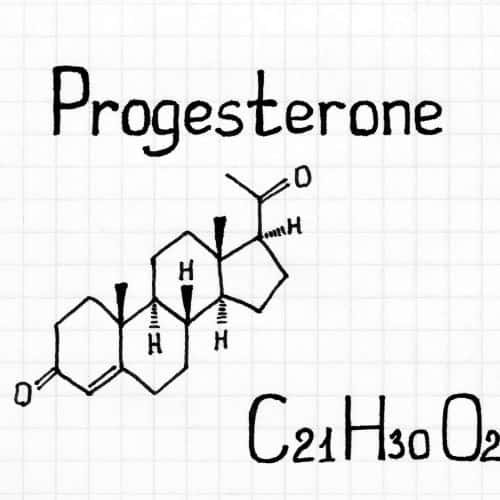Does Progesterone Cause Weight Gain?
Many women wonder if progesterone causes weight gain.
Table of Contents
ToggleIt is easy to blame dramatic changes in hormone levels for weight gain, especially if you are in a stage of your life when progesterone levels are erratic, like during menopause.
While it is true that progesterone can affect your metabolism, this hormone is just part of a complex mechanism.
Let’s dive into how progesterone can impact weight.
What Is Progesterone?

Progesterone is a sex hormone produced in the ovaries following ovulation, and it helps prepare the body for the possibility of pregnancy.
But progesterone does much more than that! This hormone impacts our brains, bones, metabolism, mood, libido, and thyroid hormone levels.
As it is a sex hormone produced after ovulation, progesterone is expected to decrease as women enter menopause. However, the decline is not a straight line down but rather goes up and down for years.
This erratic behavior can easily create a hormone imbalance that affects other hormones related to weight.
Progesterone levels also fluctuate during the menstrual cycle.
Does Progesterone Cause Weight Gain?
Progesterone does not directly cause weight gain. However, it can play a role in weight gain because of its interaction with other hormones.
How Can Progesterone Cause Weight Gain?
There are a few ways in which progesterone can promote weight gain by interacting with other hormones.
Progesterone Can Create Estrogen Dominance
When hormone levels are well balanced, estrogen and progesterone work together to regulate each other’s effects, including those involved in weight management. But when progesterone is low, estrogen becomes the dominant hormone.
Promotes Fat Storage
Estrogen promotes fat storage, while progesterone allows the body to use fat for energy.
It is easy to see that having too much estrogen compared to progesterone can result in more fat being stored at the same time that the ability for the body to use fat decreases, resulting in a perfect scenario for weight gain.
Wait, what? Don’t both hormones decrease during menopause? Yes, but progesterone might drop faster than estrogen, leading to estrogen dominance (high estrogen levels relative to progesterone levels).
Water Retention
Another interaction between progesterone and estrogen is fluid balance. Estrogen retains water, while progesterone acts as a natural diuretic that releases water. As a result, when there is too much estrogen and too little progesterone, the body retains fluids.
Fluid retention can increase body weight, and while this is not permanent, you may feel bloated, see a larger number on the scale, and become frustrated.
Insulin Resistance
Last, estrogen dominance can also increase insulin resistance, which can cause food cravings that make weight management more difficult.
As you can see, low progesterone is not a direct cause of extra body weight, but it can play a role.
Progesterone Impact on the Thyroid Hormone
Low levels of progesterone can cause the overproduction of a protein called thyroid-binding globulin (TBG). This protein binds to thyroid hormones and stops them from getting into the body’s cells to do their work.
As a result, it is possible to develop symptoms of hypothyroidism, including weight gain.
Unfortunately, this decrease in thyroid function might not be detected by normal blood tests.
Progesterone and Sleep
Progesterone promotes sleep by helping the body relax. Higher levels can make you feel sleepy. In contrast, low progesterone levels can bring anxiety, restlessness, and trouble falling and staying asleep.
That being said, let’s dive into how lack of sleep impacts weight. Ready?

Lack of sleep can change how the reward system in your brain works in response to the sight of junk food. Research suggests that people who don’t sleep enough tend to eat more processed carbohydrates and foods containing large amounts of sugar.
In addition, lack of sleep changes the normal function of the hormones that regulate your appetite and satiety, potentially making you hungrier than usual and less satisfied after you eat.
Finally, lack of sleep can increase cortisol levels which leads to weight gain, particularly around your abdominal area—often called stress belly.
What Causes Low Progesterone?
Many factors can cause low progesterone, the most common one being age. As a woman approaches menopause, her body stops producing eggs, and her ovaries cut back on their production of hormones, including progesterone.
Other causes include:
- Hypothyroidism (underactive thyroid)
- Hyperprolactinemia (elevated prolactin)
- Ovulation issues such as anovulatory cycles or polycystic ovarian syndrome (PCOS)
- Menopause
- Increased cortisol levels
- High stress
- Low cholesterol
- Over-exercising or extreme dieting
Can Progesterone Therapy Result in Weight Loss?
Progesterone therapy aims to boost progesterone levels by supplementing progesterone either synthetically or naturally.
Thus, it is only effective if progesterone levels are low to begin with.
If your levels are within normal limits, then progesterone therapy will not work on weight loss. Your physician can help you determine your progesterone levels.
Now, if your physician determines that progesterone levels are a problem, you might use a bioidentical hormone replacement therapy (BHRT) such as progesterone cream.
Bioidentical hormone therapy can potentially result in weight loss by helping balance your hormones.
Can Progesterone Therapy Cause Weight Gain?
Wait, this is confusing! Didn’t I just read that progesterone therapy can result in weight loss if progesterone levels are low?
Yes, you did. However, weight gain can also be a side effect of BHRT. Research looking at the side effects of progesterone therapy often studied the synthetic form, progestin, which is the one often found in birth control pills.
Progestin can cause water retention and bloating, unlike natural progesterone. As mentioned before, it can lead to a decrease in the body’s production of progesterone, leading to a disruption of the hormone balance in the body, including estrogen dominance.
Natural Ways to Balance Hormones
It is inevitable to see a change in hormone levels and balance during menopause, PCOS, and certain diseases. But you can minimize the impact on your body by creating healthy habits that will also help with weight management.

Natural ways to balance your hormones include:
- Eating enough protein, healthy fats, vegetables, and fruits
- Limiting caffeine and alcohol
- Eating less sugar
- Managing your weight
- Working out and moving more
- Drinking enough water
- Getting enough vitamin D
- Managing your stress
- Sleeping better
The Bottom Line
So, in conclusion, does progesterone cause weight gain in menopause?
The answer is not a straight one. It may impact weight gain, but it is not a direct cause. It depends on the reason your progesterone levels are low and if you have other factors that can contribute to weight gain.
It is essential to discuss any concerns with your physician as they will be able to determine if you have a hormonal imbalance and provide guidance on treatments. Additionally, making healthy lifestyle choices can help balance hormones naturally without the need for additional therapies.
By understanding your hormones, you can better manage them and lead a healthier life. Good luck!

Dr. Su-Nui Escobar, a Registered Dietitian/Nutritionist in Miami, FL, is dedicated to empowering women in perimenopause and menopause to live healthier, more satisfying lives.
With a doctorate in clinical nutrition from the University of North Florida, she has expertise in menopause and weight loss, including the unique challenges faced by those on weight loss medications.
Su-Nui’s passion for her field is evident in her previous role as the Academy of Nutrition and Dietetics spokesperson.


